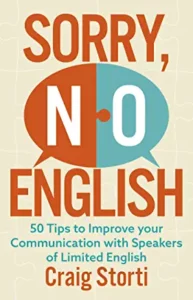Review | SORRY, NO ENGLISH by Craig Storti (Morocco)
Sorry, No English: 50 Tips to Improve your Communication with Speakers of Limited English
Craig Storti (Morocco 1970-72)
Chambers Publisher
October 2022
189 pages
$5.94 (Kindle); $12.60 (Paperback)
Reviewed bu D.W. Jefferson (El Salvador 74-76) and Costa Rica 76-77).
•
What a shame this book didn’t exist when I was trying to help my wife learn English years ago.
Craig Storti has been writing about intercultural communications for over 30 years and has published a number of useful books, but for everyone who needs to interact with speakers of limited English, this is the indispensable handbook we have been waiting for.
The book will be useful to anyone working in a public-facing job from government to hospitality, international organizations, human resources, cross-cultural and diversity training, and teaching English as a second language. Also, those who simply have an interest in languages, cultures and communication will love this book.
I recommend that you read this book cover to cover, and then put it on your reference shelf to be consulted whenever you feel that your interactions with speakers of limited English are not going as well as you would like them to.
Appendix A is the starting point for using this book as a reference. The 50 pieces of advice mentioned in the subtitle are collected there, and the page to read more about each is conveniently listed.
Appendix B is a test you can self-administer to determine if you really need this book or are already well enough versed in the topics covered. Hopefully, like me, you will recognize that one can never learn too much about how to interact productively with speakers of limited English.
Other useful features of this book include English verb phrases to avoid, English language idioms, common American slang, common British slang, English-Spanish cognates (words with the same root), English-Spanish “false friends” (words appearing to be cognates but with completely different meanings), common contractions, and common Indian English words.
My favorite “false friends” example is the English word “embarrassed” which would appear to have a Spanish cognate in the word “embarazada,” except that embarazada means pregnant! Imagine how embarrassed you would be after making that mistake while interacting with Spanish speakers!
•
D.W. Jefferson was a Peace Corps agriculture volunteer in El Salvador (1974-76) and Costa Rica (1976-77). A blog about his Peace Corps years is at: dwjefferson.blogspot.com. He is currently retired from a career in computer software engineering.

Congratulations again, Craig. Anyone going overseas would want to know and practice your 50 tips. Thanks for an informative review, JW.
Another outstanding book–congrats. Craig! I too could have used it when my Guatemalan wife was learning English although that seems too long ago to remember. You’ve done a great job looking at learning English from all angles with a dash or two of humor. I’ll put this next to my author friend, Tom Miller’s, “How I Learned English” which provides many stories from well-known Latinos who learned English.